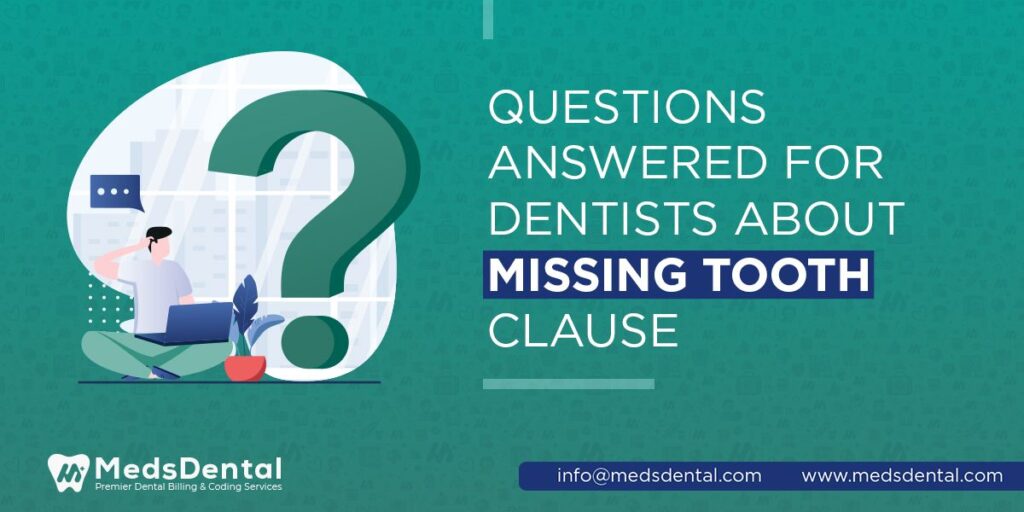

Insurance policies have become an essential part of our lives. However, many people are unaware of the details of their policies and may be surprised to find that certain situations are not covered by their insurance. Especially when it comes to dental insurance, many clauses can affect your coverage. One of the most important is the “missing tooth clause.” This clause can significantly impact your insurance benefits, so it’s essential to understand what it means and how it works. For dentists, this can create challenges in providing the best possible care to their patients while navigating the complexities of insurance coverage. In this article, we will answer common questions that dentists may have about the missing tooth clause.
A comprehensive understanding of the missing tooth clause can benefit dental practices in several ways. Firstly, it can help practices avoid financial risks and legal action by ensuring they only perform insurance-covered treatments. Secondly, it can improve patient satisfaction by providing transparent information on coverage and pricing. Additionally, it can streamline the insurance claims process, reducing the likelihood of claim denials and disputes.
To Determine Whether Pre-Authorization is Required Some dental insurance plans require pre-authorization before specific procedures are performed. Knowing whether the missing tooth clause applies to a patient’s policy can help dental teams determine whether pre-authorization is necessary before a tooth replacement procedure. This can help avoid surprises and delays in treatment.
To Avoid Billing Errors and Insurance Fraud Dental teams must be knowledgeable about the missing tooth clause to avoid billing errors and insurance fraud. If a patient has a missing tooth, and the dental team bills the insurance company for its replacement, knowing the policy’s missing tooth clause can prevent unintentional billing errors that may result in rejected claims or fraud accusations.
To Help Patients Plan and Budget for Dental Procedures Dental treatments can be costly, and patients may need to plan and budget for them in advance. Knowing whether the missing tooth clause applies to a patient’s policy can help them plan for the cost of tooth replacement, whether it’s through insurance or out-of-pocket. Dental teams can help patients understand their insurance coverage and provide estimates for the cost of treatment so that patients can plan accordingly.
The answer is no. While many dental insurance policies have a missing tooth clause, not all include this provision. Some dental insurance policies may offer coverage for tooth replacement regardless of when the tooth was lost.
Some insurance policies may have exceptions to the missing tooth clause.
Better Treatment Planning
When you better understand the missing tooth clause, you can develop more effective treatment plans for your patients. You can explore alternative treatment options covered by their insurance plan and avoid surprises or disappointments for your patients.
Improved Patient Education
By educating your patients about the missing tooth clause, you can help them make informed decisions about their dental treatment. This can lead to greater patient satisfaction and increase patient referrals.
Financial Benefits
You can also benefit financially by understanding the missing tooth clause and developing more effective treatment plans. You can avoid delays in treatment and increase revenue by offering alternative treatment options covered by your patients’ insurance plans.
If you are unaware of the missing tooth clause in your dental insurance policy, you may be caught off guard when you need dental treatment. A predetermination can help you avoid this situation by providing you with a clear understanding of what treatments are covered under your policy.
A predetermination is a process where your dental provider submits a treatment plan to your insurance company for review. The insurance company then provides a breakdown of each procedure’s estimated costs and coverage. This lets you decide about your dental care and helps you avoid unexpected expenses.
If you have any questions or concerns about a missing tooth clause or any other provision in the policy, don’t hesitate to ask your insurance provider. A reputable company should be willing to answer any questions clearly and concisely.
One way to navigate the missing tooth clause is to wait for a certain period before seeking dental treatment. Some insurance policies may have a waiting period of up to a year before coverage for missing teeth is included.
One way to bypass the missing tooth clause in your dental insurance policy is by inquiring with your insurance provider about their policy on waiving the clause if the tooth extraction and the beginning of the replacement occur within a specified period. This approach may allow you to obtain coverage for replacing a missing tooth. When asking your insurance company about waiving the missing tooth clause, there are several factors to consider:
Are you a dentist grappling with the missing tooth clause in dental insurance policies? MedsDental Dental Billing Company is here to help! We understand the unique challenges of filing insurance claims for dental procedures, especially when dealing with the infamous “missing tooth clause.” With our knowledge of insurance policies and the dental industry, we can assist you in navigating the complex world of dental insurance and offer practical solutions to help you reduce out-of-pocket expenses for your patients while staying compliant with HIPAA rules. Trust us to handle your billing needs and help you provide the best care for your patients.
© MedsDental. All rights reserved 2026. Powered by MeshSq.